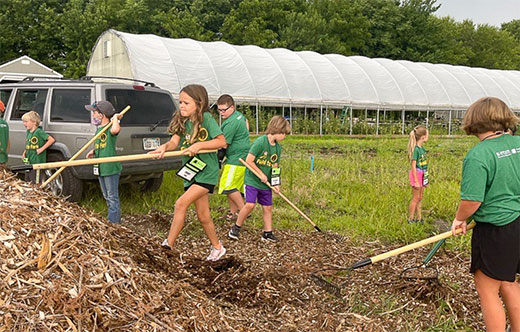
Field to Fork allowed 30 kids, ages 6-11, an opportunity to see food being grown on a farm – and even get their own hands dirty. (Photo courtesy of K-State Research and Extension, Douglas County) | Download this photo.
Field to Fork: Youth get up-close look at food on the farm
Kids learn a little more about nutrition, where their food comes from
July 28, 2022
By Pat Melgares, K-State Research and Extension news service
MANHATTAN, Kan. – As America’s communities grow more urban and the number of family farms continues to shrink, Kaitlyn Peine has a pretty good idea that an increasing number of youth today are not aware of where their food is grown.
“Most families are now two to three generations removed from a family farm,” said Peine, a community health and wellness agent with K-State Research and Extension’s office in Douglas County.
Peine recently organized an effort to help kids learn about and appreciate food production. The three-day program, called Field to Fork, allowed 30 kids ages 6-11 an opportunity to see food being grown on a farm – and even get their own hands dirty.
According to Peine, Field to Fork included activities on soil conservation, food production, botany, animal science, food preparation and nutrition. She called it “a deep dive into learning about how their food makes its journey from field to fork.”
“Not only did these kids gain a greater appreciation for how their food is produced,” Peine noted, “they also learned about making healthier choices for their own food.”
The program included field trips to Lawrence-area farms, including the Giving Garden, Kalb Farms and South Baldwin Farms.
“(Field to Fork) allowed kids to receive a hands-on experience of the way our food is grown and prepared,” said Rachel Pratt, a student intern this summer in the Douglas County office. “Working with the kids gave me the chance to experience it with them, and I loved working with them, helping them learn and learning alongside them.”
In addition to student interns, Peine said members of the Douglas County extension staff – including experts in agriculture, horticulture, 4-H and community development – helped to present the program.
“It was really rewarding to teach part of the nutrition lesson,” said summer intern Hannah Reidy. “The kids were super excited to learn and loved the snack that they prepared themselves.”
Peine said Field to Fork was funded by a grant from the Kansas Department of Education. More information on programs to benefit youth and promote community development is available at local extension offices in Kansas.

